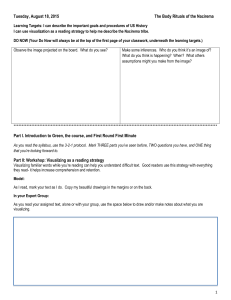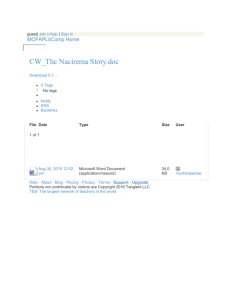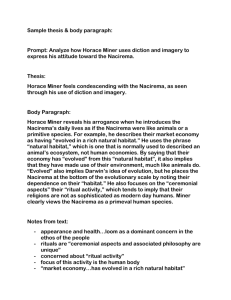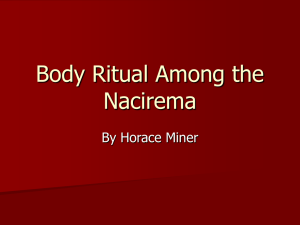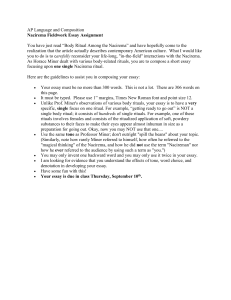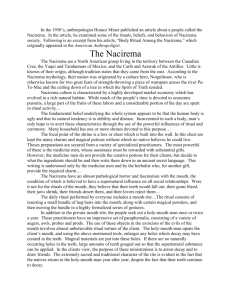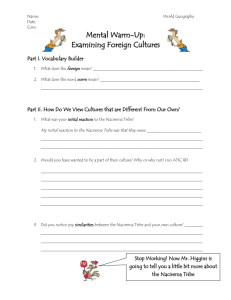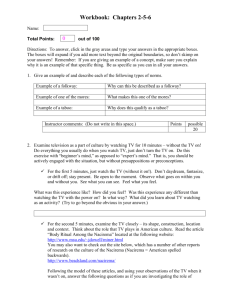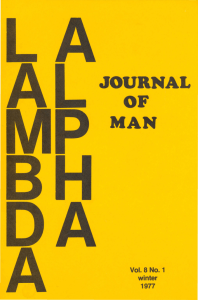Goldilocks Assignment
advertisement
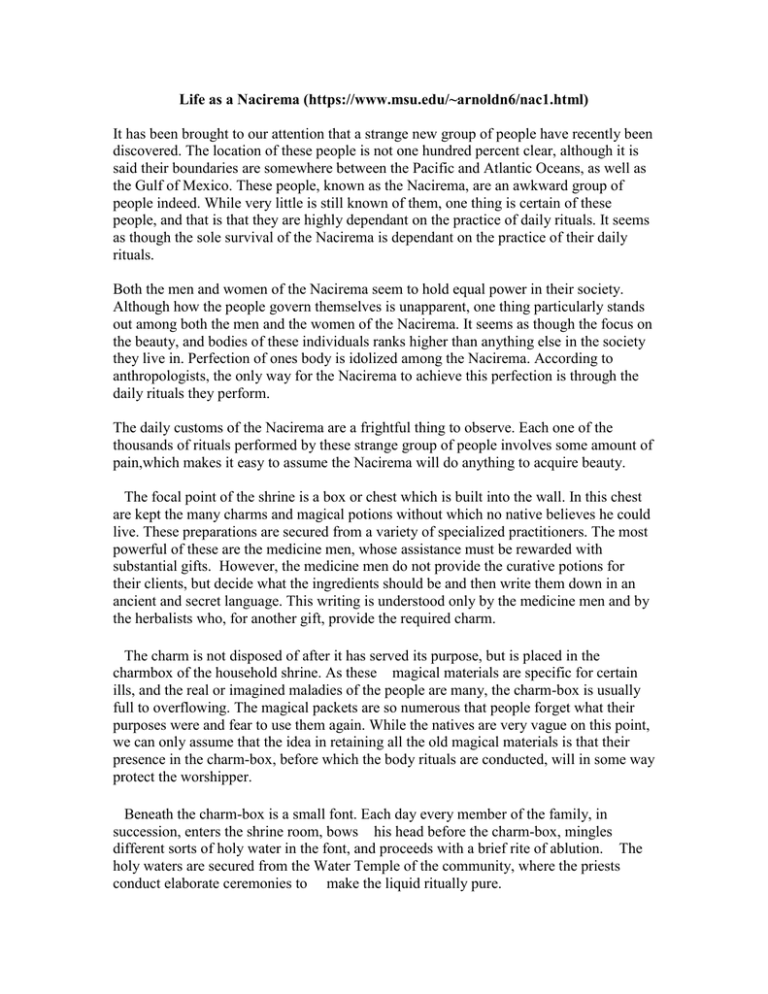
Life as a Nacirema (https://www.msu.edu/~arnoldn6/nac1.html) It has been brought to our attention that a strange new group of people have recently been discovered. The location of these people is not one hundred percent clear, although it is said their boundaries are somewhere between the Pacific and Atlantic Oceans, as well as the Gulf of Mexico. These people, known as the Nacirema, are an awkward group of people indeed. While very little is still known of them, one thing is certain of these people, and that is that they are highly dependant on the practice of daily rituals. It seems as though the sole survival of the Nacirema is dependant on the practice of their daily rituals. Both the men and women of the Nacirema seem to hold equal power in their society. Although how the people govern themselves is unapparent, one thing particularly stands out among both the men and the women of the Nacirema. It seems as though the focus on the beauty, and bodies of these individuals ranks higher than anything else in the society they live in. Perfection of ones body is idolized among the Nacirema. According to anthropologists, the only way for the Nacirema to achieve this perfection is through the daily rituals they perform. The daily customs of the Nacirema are a frightful thing to observe. Each one of the thousands of rituals performed by these strange group of people involves some amount of pain,which makes it easy to assume the Nacirema will do anything to acquire beauty. The focal point of the shrine is a box or chest which is built into the wall. In this chest are kept the many charms and magical potions without which no native believes he could live. These preparations are secured from a variety of specialized practitioners. The most powerful of these are the medicine men, whose assistance must be rewarded with substantial gifts. However, the medicine men do not provide the curative potions for their clients, but decide what the ingredients should be and then write them down in an ancient and secret language. This writing is understood only by the medicine men and by the herbalists who, for another gift, provide the required charm. The charm is not disposed of after it has served its purpose, but is placed in the charmbox of the household shrine. As these magical materials are specific for certain ills, and the real or imagined maladies of the people are many, the charm-box is usually full to overflowing. The magical packets are so numerous that people forget what their purposes were and fear to use them again. While the natives are very vague on this point, we can only assume that the idea in retaining all the old magical materials is that their presence in the charm-box, before which the body rituals are conducted, will in some way protect the worshipper. Beneath the charm-box is a small font. Each day every member of the family, in succession, enters the shrine room, bows his head before the charm-box, mingles different sorts of holy water in the font, and proceeds with a brief rite of ablution. The holy waters are secured from the Water Temple of the community, where the priests conduct elaborate ceremonies to make the liquid ritually pure. “Of Studies” by Francis Bacon Studies serve for delight, for ornament, and for ability. Their chief use for delight is in privateness and retiring; for ornament, is in discourse; and for ability, is in the judgment and disposition of business. For expert men can execute, and perhaps judge of particulars, one by one; but the general counsels, and the plots and marshalling of affairs, come best from those that are learned. To spend too much time in studies is sloth; to use them too much for ornament, is affectation; to make judgment wholly by their rules, is the humor of a scholar. They perfect nature, and are perfected by experience: for natural abilities are like natural plants, that need pruning, by study; and studies themselves do give forth directions too much at large, except they be bounded in by experience. Crafty men condemn studies, simple men admire them, and wise men use them; for they teach not their own use; but that is a wisdom without them, and above them, won by observation. Read not to contradict and confute; nor to believe and take for granted; nor to find talk and discourse; but to weigh and consider. Some books are to be tasted, others to be swallowed, and some few to be chewed and digested; that is, some books are to be read only in parts; others to be read, but not curiously; and some few to be read wholly, and with diligence and attention. Some books also may be read by deputy, and extracts made of them by others; but that would be only in the less important arguments, and the meaner sort of books, else distilled books are like common distilled waters, flashy things. Reading maketh a full man; conference a ready man; and writing an exact man. And therefore, if a man write little, he had need have a great memory; if he confer little, he had need have a present wit: and if he read little, he had need have much cunning, to seem to know that he doth not. Histories make men wise; poets witty; the mathematics subtle; natural philosophy deep; moral grave; logic and rhetoric able to contend. Abeunt studia in mores [Studies pass into and influence manners]. Nay, there is no stond or impediment in the wit but may be wrought out by fit studies; like as diseases of the body may have appropriate exercises. Bowling is good for the stone and reins; shooting for the lungs and breast; gentle walking for the stomach; riding for the head; and the like. So if a man’s wit be wandering, let him study the mathematics; for in demonstrations, if his wit be called away never so little, he must begin again. If his wit be not apt to distinguish or find differences, let him study the Schoolmen; for they are cymini sectores [splitters of hairs]. If he be not apt to beat over matters, and to call up one thing to prove and illustrate another, let him study the lawyers’ cases. So every defect of the mind may have a special receipt. (1625) How to Mark a Book By Mortimer J. Adler, Ph.D. from The Radical Academy You know you have to read "between the lines" to get the most out of anything. I want to persuade you to do something equally important in the course of your reading. I want to persuade you to write between the lines. Unless you do, you are not likely to do the most efficient kind of reading. I contend, quite bluntly, that marking up a book is not an act of mutilation but of love. You shouldn't mark up a book which isn't yours. Librarians (or your friends) who lend you books expect you to keep them clean, and you should. If you decide that I am right about the usefulness of marking books, you will have to buy them. Most of the world's great books are available today, in reprint editions. There are two ways in which one can own a book. The first is the property right you establish by paying for it, just as you pay for clothes and furniture. But this act of purchase is only the prelude to possession. Full ownership comes only when you have made it a part of yourself, and the best way to make yourself a part of it is by writing in it. An illustration may make the point clear. You buy a beefsteak and transfer it from the butcher's icebox to your own. But you do not own the beefsteak in the most important sense until you consume it and get it into your bloodstream. I am arguing that books, too, must be absorbed in your blood stream to do you any good. Confusion about what it means to "own" a book leads people to a false reverence for paper, binding, and type -- a respect for the physical thing -- the craft of the printer rather than the genius of the author. They forget that it is possible for a man to acquire the idea, to possess the beauty, which a great book contains, without staking his claim by pasting his bookplate inside the cover. Having a fine library doesn't prove that its owner has a mind enriched by books; it proves nothing more than that he, his father, or his wife, was rich enough to buy them. There are three kinds of book owners. The first has all the standard sets and best sellers -unread, untouched. (This deluded individual owns woodpulp and ink, not books.) The second has a great many books -- a few of them read through, most of them dipped into, but all of them as clean and shiny as the day they were bought. (This person would probably like to make books his own, but is restrained by a false respect for their physical appearance.) The third has a few books or many -- every one of them dog-eared and dilapidated, shaken and loosened by continual use, marked and scribbled in from front to back. (This man owns books.) Is it false respect, you may ask, to preserve intact and unblemished a beautifully printed book, an elegantly bound edition? Of course not. I'd no more scribble all over a first edition of 'Paradise Lost' than I'd give my baby a set of crayons and an original Rembrandt. I wouldn't mark up a painting or a statue. Its soul, so to speak, is inseparable from its body. And the beauty of a rare edition or of a richly manufactured volume is like that of a painting or a statue. But the soul of a book "can" be separate from its body. A book is more like the score of a piece of music than it is like a painting. No great musician confuses a symphony with the printed sheets of music. Arturo Toscanini reveres Brahms, but Toscanini's score of the G minor Symphony is so thoroughly marked up that no one but the maestro himself can read it. The reason why a great conductor makes notations on his musical scores -- marks them up again and again each time he returns to study them--is the reason why you should mark your books. If your respect for magnificent binding or typography gets in the way, buy yourself a cheap edition and pay your respects to the author. Why is marking up a book indispensable to reading? First, it keeps you awake. (And I don't mean merely conscious; I mean awake.) In the second place; reading, if it is active, is thinking, and thinking tends to express itself in words, spoken or written. The marked book is usually the thought-through book. Finally, writing helps you remember the thoughts you had, or the thoughts the author expressed. Let me develop these three points. If reading is to accomplish anything more than passing time, it must be active. You can't let your eyes glide across the lines of a book and come up with an understanding of what you have read. Now an ordinary piece of light fiction, like, say, "Gone With the Wind," doesn't require the most active kind of reading. The books you read for pleasure can be read in a state of relaxation, and nothing is lost. But a great book, rich in ideas and beauty, a book that raises and tries to answer great fundamental questions, demands the most active reading of which you are capable. You don't absorb the ideas of John Dewey the way you absorb the crooning of Mr. Vallee. You have to reach for them. That you cannot do while you're asleep. If, when you've finished reading a book, the pages are filled with your notes, you know that you read actively. The most famous "active" reader of great books I know is President Hutchins, of the University of Chicago. He also has the hardest schedule of business activities of any man I know. He invariably reads with a pencil, and sometimes, when he picks up a book and pencil in the evening, he finds himself, instead of making intelligent notes, drawing what he calls 'caviar factories' on the margins. When that happens, he puts the book down. He knows he's too tired to read, and he's just wasting time. But, you may ask, why is writing necessary? Well, the physical act of writing, with your own hand, brings words and sentences more sharply before your mind and preserves them better in your memory. To set down your reaction to important words and sentences you have read, and the questions they have raised in your mind, is to preserve those reactions and sharpen those questions. Even if you wrote on a scratch pad, and threw the paper away when you had finished writing, your grasp of the book would be surer. But you don't have to throw the paper away. The margins (top as bottom, and well as side), the end-papers, the very space between the lines, are all available. They aren't sacred. And, best of all, your marks and notes become an integral part of the book and stay there forever. You can pick up the book the following week or year, and there are all your points of agreement, disagreement, doubt, and inquiry. It's like resuming an interrupted conversation with the advantage of being able to pick up where you left off. And that is exactly what reading a book should be: a conversation between you and the author. Presumably he knows more about the subject than you do; naturally, you'll have the proper humility as you approach him. But don't let anybody tell you that a reader is supposed to be solely on the receiving end. Understanding is a two-way operation; learning doesn't consist in being an empty receptacle. The learner has to question himself and question the teacher. He even has to argue with the teacher, once he understands what the teacher is saying. And marking a book is literally an expression of differences, or agreements of opinion, with the author. There are all kinds of devices for marking a book intelligently and fruitfully. Here's the way I do it: • Underlining (or highlighting): of major points, of important or forceful statements. • Vertical lines at the margin: to emphasize a statement already underlined. • Star, asterisk, or other doo-dad at the margin: to be used sparingly, to emphasize the ten or twenty most important statements in the book. (You may want to fold the bottom comer of each page on which you use such marks. It won't hurt the sturdy paper on which most modern books are printed, and you will be able take the book off the shelf at any time and, by opening it at the folded-corner page, refresh your recollection of the book.) • Numbers in the margin: to indicate the sequence of points the author makes in developing a single argument. • Numbers of other pages in the margin: to indicate where else in the book the author made points relevant to the point marked; to tie up the ideas in a book, which, though they may be separated by many pages, belong together. • Circling or highlighting of key words or phrases. • Writing in the margin, or at the top or bottom of the page, for the sake of: recording questions (and perhaps answers) which a passage raised in your mind; reducing a complicated discussion to a simple statement; recording the sequence of major points right through the books. I use the end-papers at the back of the book to make a personal index of the author's points in the order of their appearance. The front end-papers are to me the most important. Some people reserve them for a fancy bookplate. I reserve them for fancy thinking. After I have finished reading the book and making my personal index on the back end-papers, I turn to the front and try to outline the book, not page by page or point by point (I've already done that at the back), but as an integrated structure, with a basic unity and an order of parts. This outline is, to me, the measure of my understanding of the work. If you're a die-hard anti-book-marker, you may object that the margins, the space between the lines, and the end-papers don't give you room enough. All right. How about using a scratch pad slightly smaller than the page-size of the book -- so that the edges of the sheets won't protrude? Make your index, outlines and even your notes on the pad, and then insert these sheets permanently inside the front and back covers of the book. Or, you may say that this business of marking books is going to slow up your reading. It probably will. That's one of the reasons for doing it. Most of us have been taken in by the notion that speed of reading is a measure of our intelligence. There is no such thing as the right speed for intelligent reading. Some things should be read quickly and effortlessly and some should be read slowly and even laboriously. The sign of intelligence in reading is the ability to read different things differently according to their worth. In the case of good books, the point is not to see how many of them you can get through, but rather how many can get through you -- how many you can make your own. A few friends are better than a thousand acquaintances. If this be your aim, as it should be, you will not be impatient if it takes more time and effort to read a great book than it does a newspaper. You may have one final objection to marking books. You can't lend them to your friends because nobody else can read them without being distracted by your notes. Furthermore, you won't want to lend them because a marked copy is kind of an intellectual diary, and lending it is almost like giving your mind away. If your friend wishes to read your Plutarch's Lives, Shakespeare, or The Federalist Papers, tell him gently but firmly, to buy a copy. You will lend him your car or your coat -- but your books are as much a part of you as your head or your heart.
